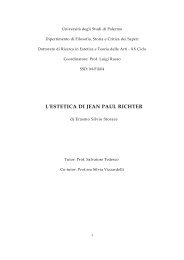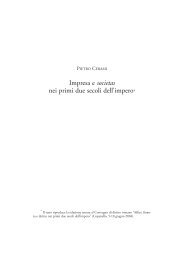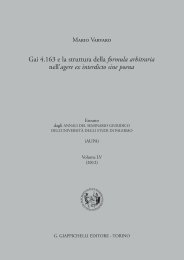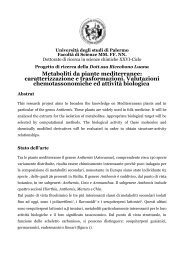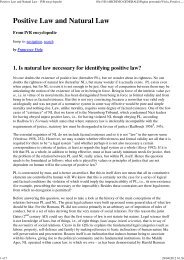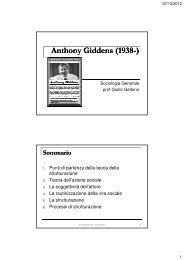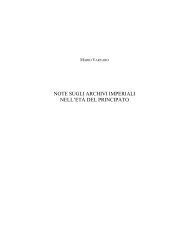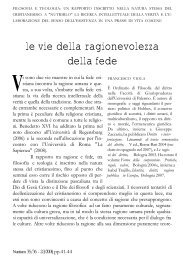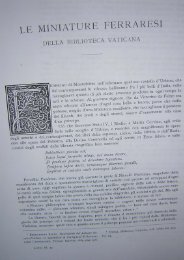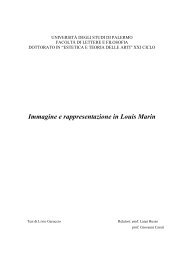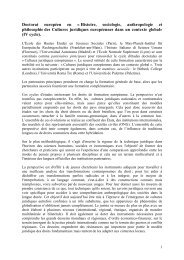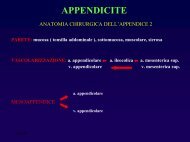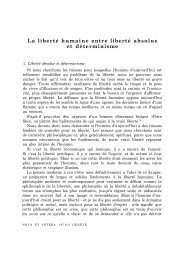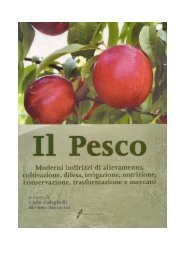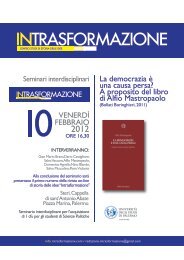Vincoli parentali e divieti matrimoniali - Università di Palermo
Vincoli parentali e divieti matrimoniali - Università di Palermo
Vincoli parentali e divieti matrimoniali - Università di Palermo
You also want an ePaper? Increase the reach of your titles
YUMPU automatically turns print PDFs into web optimized ePapers that Google loves.
ALESSANDRO CUSMÀ PICCIONE<br />
<strong>Vincoli</strong> <strong>parentali</strong> e <strong><strong>di</strong>vieti</strong> <strong>matrimoniali</strong>:<br />
le innovazioni della legislazione del IV sec. d.C.<br />
alla luce del pensiero cristiano<br />
ABSTRACT<br />
Although in the last few decades the tendency to reform the conception, for which the<br />
great part of the normative innovations recorded in the postclassic legislation (in species<br />
in matrimonial or familiar matter) has to ascribe to the action of the Church on the<br />
Empire, has assumed more and more consistency, it is still possible to <strong>di</strong>scover some<br />
fields in which the infuence of the Christian religion on the choices of normative policy is<br />
considered almost expectable. In this view, the present work aims at investigating the laws<br />
that in the IV cent. a.C. innovated the picture of the matrimonial prohibitions deriving<br />
from relationship or affinity, in relation just to three cases: wed<strong>di</strong>ng between adfines, with<br />
the neptis ex fratris and inter consobrinos. After the inheritance of the classic experience,<br />
with regard to nuptiae nefariae et incestae, was evaluated, the position assumed by the<br />
Church was investigated, as can be derived from the testimonies of the Holy Scriptures,<br />
the works of the Church Fathers and the ecclesiastical legislation; the correspondent legal<br />
regulation introduced in IV cent. a.C. (C.Th. 3.12.1, 3.12.2, C.I. 5.5.5 and C.Th.<br />
3.12.3) is then annotated. By mutual comparison it emerges that, in subiecta materia, the<br />
con<strong>di</strong>tions which the doctrine has characterized to presume the derivation of the imperial<br />
laws from the Christian religion – such as the correspondence of the contents, the<br />
anteriority of the Christian <strong>di</strong>scipline regar<strong>di</strong>ng that legislative one, the exclusion of other<br />
motives and the identification of the effective channel of relation – don’t exist completely<br />
or exist only partially, with the consequence that the examined imperial provisions can be<br />
considered as “Christian measures” not as <strong>di</strong>rectly influenced by the Church, but rather<br />
by virtue of the fact that they are not contrary, lato sensu, to the spirit of the nova religio.<br />
PAROLE CHIAVE<br />
Divieti <strong>matrimoniali</strong>; parentela; affinità; costituzioni imperiali; Padri della Chiesa; concili.



